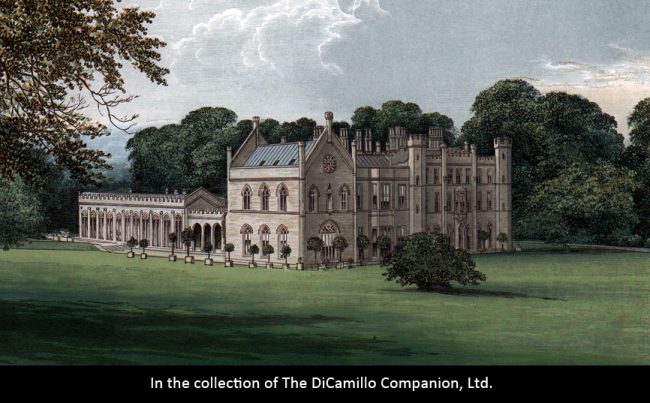
The house from "Morris's Views of Seats," circa 1875.
Earlier Houses: In the 13th century a church under the auspices of the abbess of Godstow was located on, or near, the site of the current house. Also possibly on the site was the Medieval Hospital of St. Margaret and St. Giles. After the Dissolution of the Monasteries a private home, Loakes Manor, was created using parts of the ecclesiastical buildings; it is very likely that elements of these earlier buildings were incorporated into the current house.
House & Family History: The mostly 17th century Loakes Manor was rebuilt as the Gothic style Wycombe Abbey in the early 19th century by the 1st Baron Carrington. According to the Centre for the Study of the Legacies of British Slavery at University College London, in 1837 the British government awarded the 1st Lord Carrington a payment of £4,908 (approximately £4 million in 2019 values using the labour value commodity index) in compensation for the 268 slaves that he owned in Jamaica that were freed as part of the Slavery Abolition Act 1833. The British government took out a £15 million loan in the 1830s (approximately £12 billion in 2019 values) arranged by the Rothschild bank to finance the freeing of slaves owned by its citizens; the government paid off the last of the loan in 2015. The house and 30 acres were sold by the 3rd Baron Carrington in 1896 to Wycombe Abbey School. In 1942 the British government requisitioned Wycombe Abbey and Daws Hill to serve for 8th Bomber Command for the U.S. Army Air Force after the entry of the United States into World War II. The buildings were returned to the school in May of 1946.
Garden & Outbuildings: The Loakes Manor Estate once spanned thousands of acres; today's Wycombe Abbey Estate is a much smaller estate that includes gardens and woodlands. During World War II a large encampment of tents and huts was constructed within the parkland. The estate also contains a Grade II*-listed decommissioned nuclear bunker that was once part of the Ministry of Defence's RAF Daws Hill (Daws Hill is part of the Wycombe Abbey Estate). The 23,000-square-foot underground bunker housed high tech equipment for the direction of nuclear bombers and guided missiles and was an important part of U.S. Strategic Air Command operations based in Britain during the Cold War. Because of its nuclear weapons, especially cruise missiles, the site was frequently the site of protests; between 1982 and 1985 there was a also peace camp nearby. After the U.S. Navy used it for U.S. Visiting Forces in the early 2000s, the site was transferred to the RAF in 2007; in 2011 most of the land was sold to a property developer, Taylor Wimpey Plc, who created a housing estate of approximately 450 homes called Pine Trees on the site.
Architect: Lancelot Brown
Date: Probably 1760sArchitect: Henry Keene
Date: Circa 1755-59Architect: Humphry Repton
Designed: LandscapingArchitect: James Wyatt
Date: Circa 1804House Listed: Grade II*
Park Listed: Grade II
Past Seat / Home of: Thomas Archdale, until 1700. Henry Petty, 1st Earl of Shelburne (first creation), 1700-51; John Petty Fitzmaurice, 1st Earl of Shelburne (second creation), 1751-61; William Petty Fitzmaurice, 2nd Earl of Shelburne and 1st Marquess of Lansdowne, 1761-98. Robert Smith, 1st Baron Carrington, 1798-1838; Robert John Carrington, 2nd Baron Carrington, 1838-68; Charles Robert Wynn-Carington, 3rd Baron Carrington and 1st Marquess of Lincolnshire, 1868-96.
Current Ownership Type: School
Primary Current Ownership Use: School
Ownership Details: Since 1896 Wycombe Abbey School, an independent girls' boarding school.
House Open to Public: No
Phone: 01494-520-381
Email: [email protected]
Website: https://www.wycombeabbey.com/
Historic Houses Member: No